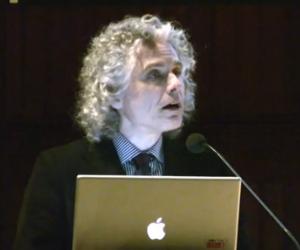
Of the many things I love that are enabled by the internet, getting a free education has to be among the best. There are thousands of high quality lectures available online, allowing anyone with good connectivity to expand their understanding with the help of some of the brightest and most gifted thinkers on the planet. Harvard University, in a nod to conferences like TED, has recently completed its second annual Harvard Thinks Big series. In these yearly events, 10 of the most famous of the faculty give 10 minute talks fit to excite, entertain, and enlighten their audience. The topics range from storytelling and imagery in fairy-tales to how becoming a geek could get you girls. I’ve chosen a few of the best (and most Hub-related) videos to share with you below – including a look at the continuing importance of cities, and humanity’s need to overcome biologically-driven morality. Easily digestible but thoroughly inspiring, these short talks are just the sort of presentation that can keep you hungry for learning. Thanks again, Harvard, for the good education.
As we’ve discussed before, our empirical understanding of the brain is improving and with that knowledge comes the opportunity to reexamine our social, legal, and moral assumptions. Joshua Greene is a professor of psychology who uses fMRI, transcranial magnetic stimulation (TMS) and genotyping to better understand how humans make decisions. He and his colleagues have discovered that there are multiple mechanisms in our brain for choosing between right and wrong. In the following video, Greene asks us to consider which mechanisms we should keep, and we should abandon as we move towards building a global community:
With the spread of high speed internet connections, more of us are able to communicate across vast distances with low cost and high fidelity. Webcams and chat rooms are just the beginning. Is this connectivity going to ring the death knell for cities? After all, why live in a crowded urban setting when you can communicate with anyone in the world from your lush rural paradise? In the following video Edward Glaesar, a professor of economics, makes the case that cities will expand and thrive in the upcoming era. Physical proximity will stay valuable:
Last year’s inaugural Harvard Thinks Big had several great speakers. The following videos are of Steven Pinker’s discussion on the falling rates of violence over the course of civilization, and Andrew Barry’s talk on how geneticists will be able to find the differences that separate us from other animals. Both are well worth your time.
While many of the Harvard Thinks Big talks aren’t about science and technology, I encourage you to browse through all the videos and find others that tickle your fancy. The 2010 lectures are available on the HUTV site, while the 2011 talks are becoming available on one of Harvard’s YouTube channels. Short presentations like these are a wonderful launching pad to push you to investigate new topics you may not have been exposed to otherwise.
10 minutes is hardly enough time to become an expert in a new subject, but there is certainly a lot of value in short introductory lectures for those looking to continue their education. Many universities are slowly making their main classroom lectures readily available online, not just for their students, but for the world as a whole. As that happens, I think we’ll see many more people use the internet as a means of obtaining access to some of the highest levels of academic discourse. When they do, will the boundaries between formally educated and informally educated fade? Hmm…I don’t know. Hey, Harvard, get a professor to lecture on that next year, okay?
[screen capture and video credits: HUTV]
[source: HUTV Network (Harvard Thinks Big)]


